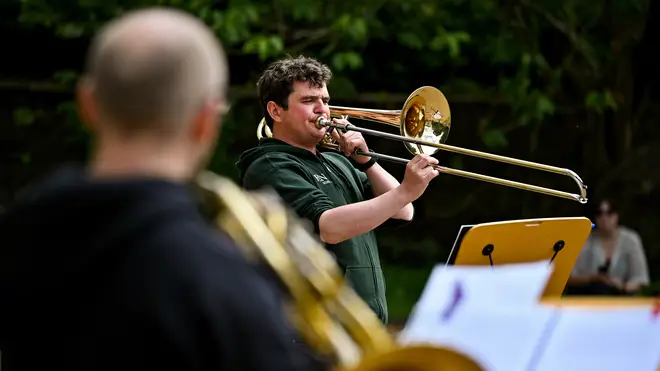‘Let’s be stronger’: calls for a bold recovery in orchestral sector at British orchestras conference
9 February 2022, 17:21

As live music returns to the stage, Britain’s orchestras are thinking about how to tackle big, new challenges as the Association of British Orchestras (ABO) annual conference gets underway in Glasgow.
Listen to this article
Orchestras and musicians from across the British Isles have gathered in Glasgow for the Association of British Orchestras (ABO) conference, with a focus on finding ways to adjust, grow and thrive in a changing cultural landscape after the deep disruptions of Covid lockdowns.
Angus Robertson MSP, Cabinet Secretary for the Constitution, External Affairs and Culture gave the keynote speech to begin 2022’s ABO conference on Wednesday afternoon.
“Live music can have a significant and profoundly positive impact on mental health and wellbeing,” Robertson told the conference. “We want to ensure that through the recovery, culture is being mainstreamed though as all the work of government.”
Robertson revealed he was himself one a violinist, playing in the ranks of the Edinburgh Secondary Schools Orchestra.
After almost two years of Covid disruptions and cancellations, he called for bold ideas and initiatives from the orchestral sector to engage new audiences, saying inclusion and accessibility in culture was a big priority for the devolved Scottish government.
Read more: Playing Classic FM ‘could help lift spirits’ in Covid vaccination centres, says MP
Let’s not just rebound - let’s come back stronger than before and ensure everyone has access to culture - Q&A with @ginadavidsonlbc @global’s Scotland Political Editor and @AngusRobertson @culturescotgov @RSNO @ClassicFM #abo22 pic.twitter.com/d6q45fgZVI
— ABO (@aborchestras) February 9, 2022
“Music can be a brilliant way of engaging young people and giving them a creative outlet,” he said, then asking, “What is it that we can do to help younger people from more deprived backgrounds to get to experience culture?”
“Let’s not just bounce back, let’s not just rebound – let’s be stronger than we were before.”
He pointed to the Scottish government’s Youth Music Initiative, through which every young person receives one year’s music tuition before leaving primary school. He said music is now the sixth most popular subject at Advanced Higher in Scottish secondary schools.
The Member of Scottish Parliament also called on orchestras, newspapers and broadcasters to help share the message that live music is back, and safe to attend.
Sharing day one’s programming at the conference was social commentator Darren McGarvey, the director of music at Southbank Centre, Gillian Moore CBE, and Lord Mendoza, DCMS Commissioner for Cultural Recovery & Renewal.
The British orchestral sector ‘Rebounding’
2022’s ABO conference is titled Rebound and will have a focus on how British orchestras are recovering from two years of COVID-19 disruption and change.
Mark Pemberton, the ABO’s director, said: “As the UK government proclaims a rebound to the economy from the worst of the pandemic, it is time to look at whether the same applies to our sector.”
The forum will include keynote speeches and panel discussions to explore the critical issues facing the classical music sector in 2022, and to discuss the ways the industry can innovate and work together to create an ambitious ‘rebound’ and future for the industry.
Pemberton said there are systemic challenges for the orchestral sector to address, with socio-economic barriers to music, sustainability, and the challenges of Brexit for touring orchestras all to be discussed.
Prior to the conference Deborah Annetts, chief executive of the Incorporated Society of Musicians (ISM), told Classic FM’s sister station LBC that for many musicians, the cost of touring is “literally thousands of pounds –and they don’t make that much money when they’re actually touring”.
“And for orchestras, they’re faced with all the additional problems around cabotage. New regulations mean an awful lot of orchestras […] can’t tour anymore,” Annetts added.
‘We’re continuing to adapt to our audiences,’ says Classic FM’s Managing Editor
Classic FM, in its 30th birthday year, is also marking 20 years as Principal Media Partner of the Conference.
In a speech to open the three-day forum, Classic FM’s Managing Editor, Philip Noyce underlined radio’s role in helping the orchestral sector adapt to a post-pandemic audience.
Classic FM has 5.1 million listeners, with one in 10 adults in the UK tuning in to Classic FM every week. But Noyce said it’s also important to keep finding new ways to connect to listeners.
“While traditional radio listening remains robust we have seen some seismic shifts in media consumption, as we move with pace to a world of on-demand viewing and listening,” he said. “We’re continuing to adapt to our audiences’ needs and expectations.”
Noyce told delegates that the growth and success of Global Player, Classic FM’s app for live radio listening, catch-up, playlists and podcasts, is a key part of this evolution for the radio station.
Global Player now has over 10 million monthly listeners, he said, and is allowing Classic FM and all Global radio brands to reach audiences in new ways.














